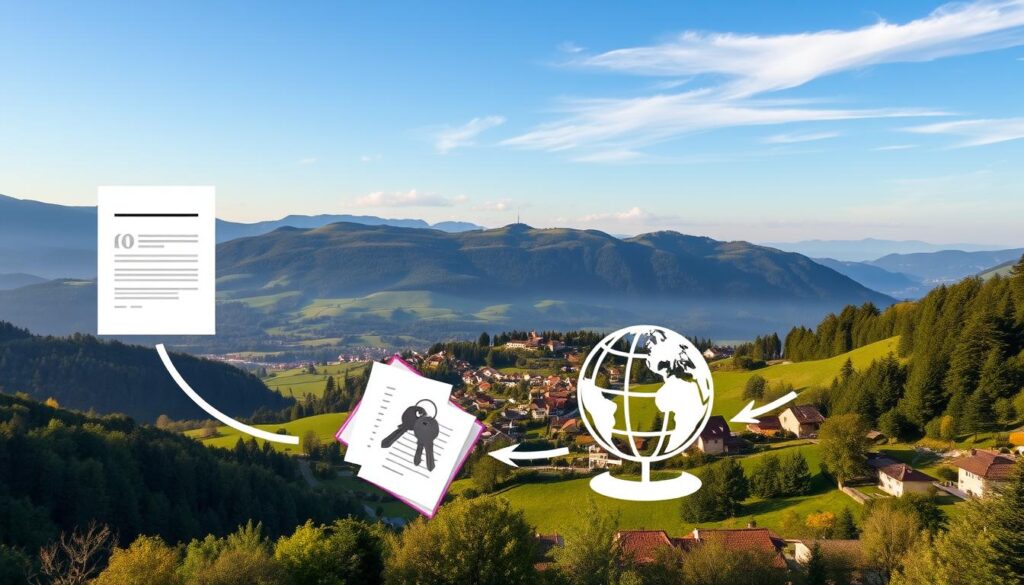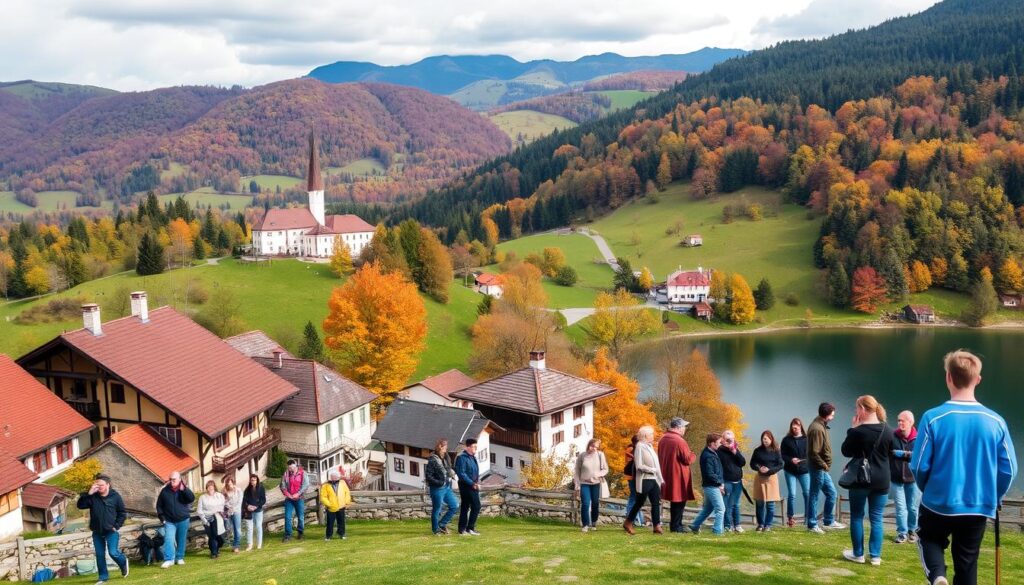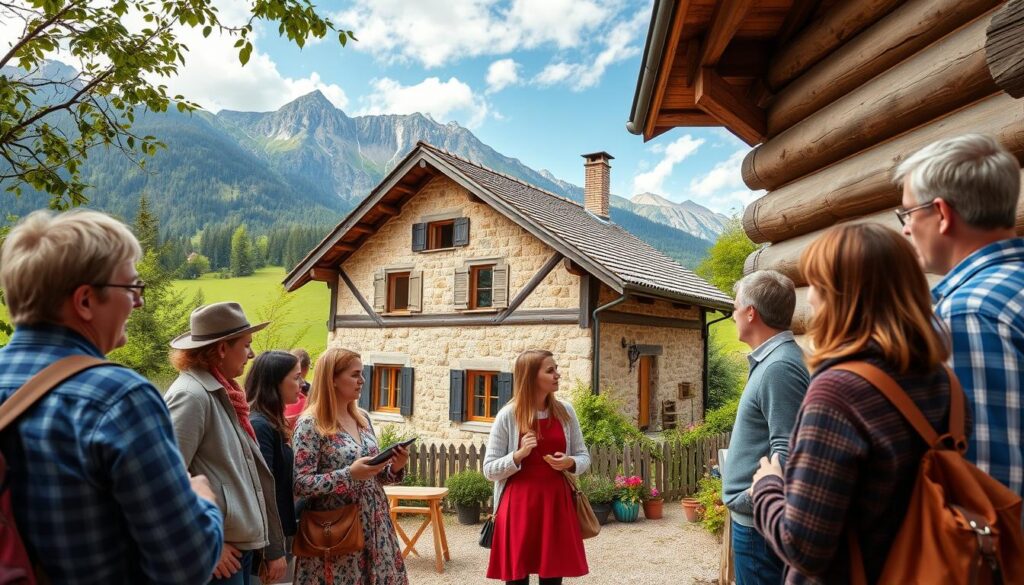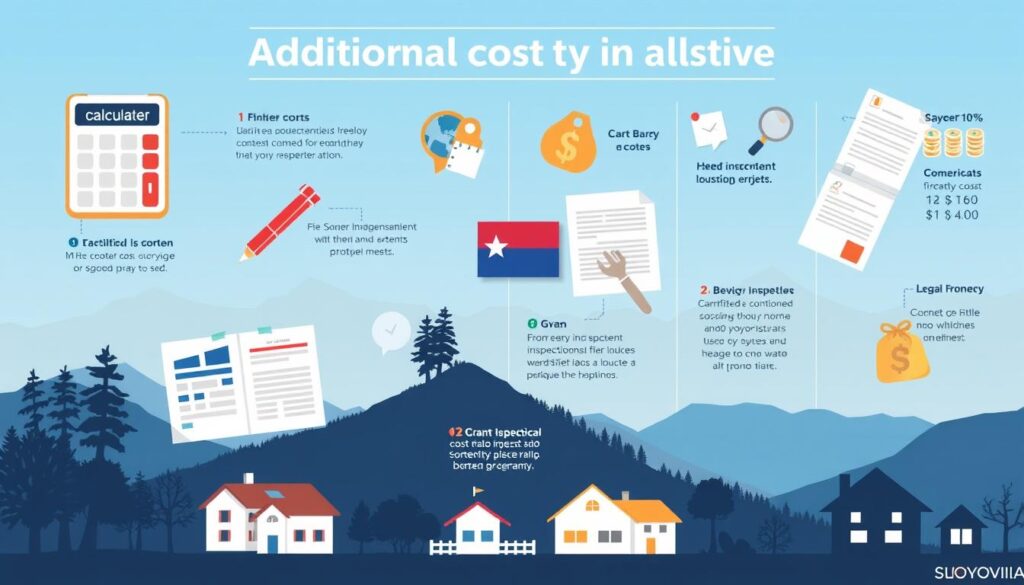In recent years, Slovenia has increasingly become a hotspot for international property buyers. The picturesque landscapes, stable economy, and European Union membership make it an attractive destination. But the key question remains: can foreigners buy real estate in Slovenia? Indeed, they can, though specific regulations and requirements exist to navigate through this process.
Since February 2003, Slovenia has permitted foreign ownership of real estate based on the principle of reciprocity. This essentially means that if Slovenians can purchase property in your home country, then you have the right to buy in Slovenia. Member states of the European Union, including Iceland, Liechtenstein, Norway, and the United States, have the privilege to purchase without restrictions.
Swiss nationals can also acquire real estate but must have Permit C. Non-EU citizens, however, face additional requirements. They can purchase property through a registered Slovenian company, inheritance, or marital citizenship, provided there is a reciprocity agreement between Slovenia and their home country1
Key Takeaways: How to Buy a Property in Slovenia
- Foreigners can buy real estate in Slovenia based on reciprocal agreements.
- EU citizens can purchase properties without restrictions.
- Non-EU citizens can buy property through various legal routes, such as setting up a Slovenian company.
- Swiss nationals need Permit C for real estate acquisition.
- Reciprocity determines the eligibility for property purchases for non-EU nationals.2
Contact us if you are Interested in Buying Property Abroad!
Introduction to the Slovenian Real Estate Market
The Slovenian real estate market is a vibrant and diverse sector, offering a multitude of property options, from luxury homes and apartments to commercial premises and renovation projects3. With around 50% of the country covered in forests, Slovenia ranks as the third most forested country in Europe, trailing only behind Finland and Sweden3. Furthermore, real estate ownership for foreigners is subject to specific conditions that are governed by Slovenian law or international treaties4.
Overview of the market
Slovenia’s real estate market is known for its diversity, providing everything from affordable properties ripe for renovation to high-end luxury estates3. The country’s legal framework ensures that foreigners, particularly from the EU, have the same rights as locals when acquiring property, making the market accessible for a broader audience4. Foreign investors can benefit from the safe and stable environment Slovenia offers, backed by the stringent regulations that govern property transactions in the country.
Why invest in Slovenian real estate?
Investing in Slovenian real estate is an appealing option due to the nation’s natural beauty, cultural heritage, and strategic location at the crossroads of Europe3. Moreover, Slovenia’s low crime rate enhances its appeal as a secure investment destination3. The Land Register system adds an extra layer of trust and transparency to property ownership, making the process smoother and more reliable for both local and foreign buyers4. Additionally, the legal protections afforded to overseas buyers are identical to those extended to Slovenian residents, ensuring fair transactions3.
Popular locations for property investment
Hotspots for real estate investment in Slovenia include the bustling capital Ljubljana, known for its vibrant culture and historical significance3. Maribor stands out with its university and picturesque vineyards, while Piran, famous for its salt production, offers coastal charm and hosts events celebrating its unique heritage3. The lake resorts of Bled and Bohinj, situated in the Julian Alps, attract tourists from around the globe, providing lucrative opportunities for rental income and long-term investment43.
For a comprehensive understanding of how foreigners can navigate the real estate market and acquire ownership rights in Slovenia, refer to reliable resources such as this detailed guide on buying property in Slovenia4.
Legal Requirements for Foreigners Buying Property in Slovenia

Understanding the legal requirements for foreigners buying property in Slovenia is crucial for anyone looking to invest in this charming European country. The process involves several key steps and documentation to ensure a smooth transaction. This section provides an overview of the regulations, necessary documentation, and approval processes tailored to different buyer categories.
Key regulations affecting foreign buyers
Foreigners purchasing property in Slovenia must comply with distinct legal frameworks. For instance, the principle of reciprocity allows citizens of countries like the United States to buy property without restrictions5. Non-EU buyers often need to comply with specific treaties or set up a Slovenian company to facilitate the purchase. These regulations ensure that the interests of the Slovenian market and foreign investors are balanced, promoting a fair real estate environment.
Documentation necessary for purchase
Documentation is a critical part of purchasing property in Slovenia as a foreigner. Essential documents include proof of identity, financial capacity, a unique EMŠO number, and a tax number6. Buyers need to open a local bank account to facilitate transactions and deposits. Typically, a 10% deposit is required to secure the property, and the entire process can be completed within about a month6. Engaging a local lawyer can help ensure all legal aspects are covered, minimizing potential pitfalls encountered during the acquisition process.
Approval process for non-EU buyers
Non-EU buyers must follow specific procedures to get approval for property purchases in Slovenia. This often involves compliance with bilateral treaties that stipulate conditions for property ownership. Alternatively, non-EU nationals can register a Slovenian company to bypass some restrictions. The ownership transfer typically takes around 3 to 6 months to finalize the legal processes involved5. Prospective buyers are encouraged to work closely with licensed real estate agents and legal experts who are familiar with Slovenian property laws5.
For more detailed information on the buying process, you can refer to resources provided by real estate experts such as Elite Property Slovenia to ensure compliance with all legal requirements for foreigners buying property in Slovenia.
Can Foreigners Buy Real Estate in Slovenia?

Buying property as a non-resident in Slovenia is a feasible option under certain conditions. Citizens of the EU, USA, and all OECD countries have the privilege of purchasing real estate in Slovenia without restrictions since Slovenia’s accession to the EU in 20047. For individuals from non-EU countries, including aspiring EU members, purchasing property requires obtaining permission from the Ministry of Justice8.
The process of acquiring a property usually involves documentation such as a notarized copy of the passport and property details provided by the Surveying and Mapping Authority8. The entire process can take anywhere between 1-2 months, extending slightly longer if the property includes farming land7. It’s important to note that the total duration for the property acquisition process ranges from 95 to 124 days8.
For the Slovenia property market for expats, foreigners also have the option of establishing a company in Slovenia, enabling them to buy real estate without the typical restrictions7. This option is particularly favorable for non-EU nationals aiming to invest in the country. Understanding the financial implications is crucial as the real estate agency commission varies from 1% to 4% of the property’s final agreed price, plus an additional VAT of 20%7.
The property market also involves various taxes and fees. Property buyers in Slovenia are subject to a 2% transfer tax, a 22% VAT, and a registration fee that ranges from 0.01% to 0.50% of the property value8. Notary fees and real estate agent commissions also play a significant role in the financial landscape of property acquisition. This intricate financial ecosystem makes it essential for potential expat buyers to be well-prepared.
Overall, the Slovenia property market for expats offers multiple avenues for property ownership, whether through direct purchase or business establishment. Hence, buying property as a non-resident in Slovenia requires a thorough understanding of these specific conditions to streamline the investment process.
The Role of Reciprocity in Property Purchases

Slovenia’s property market for expats is governed significantly by the principle of reciprocity. This principle ensures that foreign nationals from countries with mutual agreements can purchase real estate in Slovenia with relative ease.
Understanding the reciprocity principle
The reciprocity principle allows foreign nationals to buy property in Slovenia if their home country permits Slovenians to do the same. This legal foundation fosters mutual respect and balanced opportunities between Slovenia and other nations. As a result, participants in the property market for expats in Slovenia often find the process straightforward if their country has a reciprocal agreement. Citizens of the EU, OECD, and EFTA member countries fall under this category and face no restrictions when purchasing real estate in Slovenia9.
Countries with reciprocity agreements
Several countries maintain reciprocity agreements for real estate purchases with Slovenia, including members of the European Union, the European Economic Area, and the United States. These agreements allow their nationals to navigate real estate transactions smoothly. Since February 2013, foreigners have enjoyed the entitlement to purchase real estate based on these reciprocity principles, simplifying the procedure significantly10. Moreover, EU candidate countries such as Albania, North Macedonia, Montenegro, and Serbia can acquire real estate by establishing reciprocity conditions9.
Implications for foreign buyers
For many foreign buyers, the existing reciprocity agreements mean less bureaucratic red tape and straightforward processes. Americans, for example, can purchase real estate in Slovenia under a reciprocal agreement, making their involvement in the property market for expats in Slovenia seamless11. However, nationals from countries without such agreements must explore alternative options, such as registering a Slovenian company or obtaining special permission from the Ministry of Justice11. These additional steps ensure compliance with local regulations and help buyers align with Slovenia’s legal framework.
To delve deeper into the specifics of these procedures, visit the detailed guide available on Lexology11.
Purchasing Property as an EU Citizen

The process of EU citizens buying property in Slovenia is straightforward and favorable, offering minimal bureaucratic hurdles compared to non-EU buyers. This ease is attributed to the alignment of Slovenian property laws with EU regulations, ensuring EU citizens can acquire real estate using the same rights as Slovenian nationals.
Requirements for EU citizens
EU citizens can purchase both residential and commercial properties in Slovenia without needing special permissions. Unlike non-EU citizens, who must undergo a more stringent process, EU citizens only need to provide standard identification and financial documentation during the transaction. This streamlined process ensures the acquisition of real estate in Slovenia as a non-citizen, but from another EU state, is hassle-free.
Benefits of being an EU citizen buyer
One of the key benefits for EU citizens buying property in Slovenia is the simplified legal requirements. The transactions are secured by mandatory written agreements and notarized deeds, providing a high level of legal protection12. Additionally, property transactions for EU citizens do not have the conditional eligibility of non-EU buyers, such as registration with the tax authorities and obtaining a personal identification number (EMŠO)12.
Another significant advantage is the potential for purchasing real estate without the need for Slovenian residency, making it easier for EU citizens to invest in property for various purposes, including holiday homes or rental properties. The favorable tax conditions, such as a fixed property transfer tax of 2% and registration fees between 0.01% and 0.50%, further incentivize purchases by EU citizens8.
Contact us if you are Interested in Buying Property Abroad!
Rules for Non-EU Citizens
Non-EU real estate ownership rules in Slovenia entail a series of stringent conditions and steps for foreign buyers. These rules are in place to ensure regulatory compliance and proper legal procedures for purchasing property in Slovenia as a foreigner. The country’s real estate landscape, governed by Article 68 of the Constitution, sets distinct requirements for foreign nationals outside the EU, OECD, and EFTA member states. Purchasing property in Slovenia as a can be complex yet attainable, given the necessary approvals and processes are followed.
Specific regulations for non-EU buyers
Non-EU citizens aiming to purchase property in Slovenia must comply with several key regulations. Primarily, they must either inherit property, establish a business entity within Slovenia, or demonstrate reciprocal property rights with their home country. Reciprocity determination is critical for EU candidate countries like the Republic of North Macedonia, Republic of Serbia, Montenegro, and the Republic of Albania, as they need to acquire permission from the Ministry of Justice12. Additionally, non-EU foreign companies must register with Slovenian tax authorities, obtain a tax number, and secure an identification number by registering with the Business Register of Slovenia12.
Steps to obtain buying permission
For non-EU citizens to navigate the non-EU real estate ownership rules in Slovenia, they must follow a defined set of steps. Firstly, potential buyers need to demonstrate reciprocal property rights, establishing whether their home country’s legislation permits Slovenian citizens to purchase real estate there13. If eligible, they must file applications with the Ministry of Justice, which involves submitting necessary documents and waiting for approval. Successful acquisition usually requires a comprehensive understanding of Slovenian real estate law and thorough documentation, including notarial deeds, which provide the highest level of transaction security12.
Registering a business is a viable route for non-EU citizens. This registration involves acquiring a tax number and personal identification number (EMŠO) for individuals, ensuring full compliance with Slovenian laws12. Foreign individuals owning taxable real estate but without residency must also register in the tax register. Following these steps ensures non-EU buyers can successfully navigate the purchasing property in Slovenia as a foreigner while respecting all legal stipulations.
Setting Up a Business to Buy Property

Establishing a business entity for property acquisition in Slovenia is a strategic choice for non-EU individuals. It grants the same property rights as those enjoyed by local companies, enabling smoother and more secure transactions.
Advantages of a Business Entity in Property Acquisition
One of the primary benefits of setting up a business entity for property acquisition in Slovenia is the facilitation of property rights registration with fewer legal hurdles. By registering a foreign business, individuals can align with local laws more effectively, ensuring their transactions are compliant and protected. Additionally, setting up a business provides eligibility for tax benefits and opportunities for leveraging Slovenia’s favorable business environment.
Moreover, owning property through a business entity can streamline the management and administration of the property. This approach can also offer enhanced protection against legal disputes and greater credibility in the local market.
Process for Registering a Business in Slovenia
The process of foreign business registration in Slovenia is thorough yet straightforward. It involves several key steps:
- Choosing a suitable business activity that aligns with one’s objectives.
- Registering the company at the Slovenian Business Register.
- Obtaining the essential tax numbers and ensuring compliance with Slovenian tax laws.
- Gathering and submitting the required documentation, which may include a notarial deed to ensure legal protection14.
As part of the registration, foreign companies need an identification number if they wish to register property rights in the Land Register14. Additionally, foreign natural persons who own taxable real estate in Slovenia must apply for entry in the tax register and request an EMŠO number12.
The assistance of local service providers can be invaluable in navigating the registration process, ensuring compliance with all regulatory requirements, and expediting the entire procedure. These providers can offer expert advice, help with paperwork, and facilitate smoother interactions with local authorities, making foreign business registration in Slovenia more accessible and efficient.
Taxes and Additional Costs

When purchasing property in Slovenia, it’s crucial to comprehend the associated taxes and additional costs.Slovenia real estate taxes and the additional costs of buying property in Slovenia can significantly impact the overall investment.
Overview of taxes for property buyers
For new buildings, a VAT of 20% of the transaction amount is applicable, but a taxpayer legal entity may receive a refund on the VAT paid15. For secondary real estate purchases, a 2% tax on the transfer of ownership applies15. Annual property taxes in Slovenia are relatively low, averaging €150 per year for a three-bedroom house and around €250 for larger properties16. An expected yield of 6% per year makes buying property a sound financial decision15.
Additional expenses to consider
There are several additional costs of buying property in Slovenia that potential property buyers must factor in. Legal, translation, and notary fees typically average around €50016, while real estate agency fees usually range from 1-2% of the transaction value, though certain properties may attract no commission fees at all16. Buyers also need to consider registration fees, which range from 0.01% to 0.5% of the transaction amount, and notary fees, which fall between 0.01% and 0.4% of the transaction amount15. Additionally, the buyer is responsible for paying the agent’s fee, which typically amounts to 1-2% of the property’s worth15. When property is sold within 20 years of ownership, capital gains tax may apply, with the tax rate decreasing the longer the property is held.
Steps to Successfully Purchase Property
Acquiring property in Slovenia can be a rewarding investment if approached strategically. Here are the essential steps to buy property in Slovenia:
Finding the right property
The first step is to identify a suitable property that meets your needs. Conducting thorough research and seeking professional assistance from a licensed real estate agent is advisable, especially since real estate agent fees cannot exceed 4% of the property’s price, plus 20% VAT17. Additionally, verifying the agent’s license with the Slovenian Chamber of Commerce and Industry ensures you are dealing with registered professionals18.
Once you’ve shortlisted potential properties, consider the location, size, and condition. Property values in Slovenia have been on a steady rise due to the country’s growing economy and popularity as a tourist destination, making it an attractive option for foreign investors19. Property inspections, which cost between €200 and €500, are also crucial18.
Legal due diligence
Legal due diligence in real estate transactions is critical to ensure a seamless property acquisition process. It is essential to verify the ownership, check for any encumbrances, and ensure that all statutory approvals are in place. Legal fees for property purchases in Slovenia usually range from 1-2% of the property value19, and hiring a lawyer is highly recommended to navigate these legalities. Furthermore, notary fees in Slovenia typically range from 0.1% to 0.3% of the property value and include a 20% VAT1719.
Finalizing the purchase
After completing legal due diligence, it’s time to finalize the purchase. Registration fees at the Land Registry are approximately 0.50% of the property value17. Engaging a notary to draft the sales contract ensures that the transaction complies with Slovenian law, and the contract then needs to be registered with the Land Registry, which costs around €5019. Additionally, the transfer tax for properties in Slovenia is about 2% of the property value19. It is important to account for these costs to avoid any last-minute surprises.
In conclusion, taking the right steps to buy property in Slovenia, such as conducting due diligence and finalizing the purchase carefully, can lead to a successful investment. This process often involves collaborating with professional real estate agents and legal advisors to ensure a smooth and legally compliant transaction. By following these steps, you can confidently navigate the Slovenian real estate market and secure your dream property.
Benefits of Owning Property in Slovenia
Owning property in Slovenia offers numerous advantages, making it a compelling choice for investors. The country not only offers picturesque landscapes and a robust rental market but also promises long-term investment security supported by a stable economy and real estate growth.
Living in a safe and beautiful country
Slovenia is celebrated for its natural beauty, from serene lakes such as Lake Bled to its captivating Alpine scenery. Moreover, the country boasts a very low crime rate, ensuring safety for residents and investors alike, a factor that significantly enhances its attractiveness as an investment destination20.
Potential for rental income
The potential for renting out properties in Slovenia is promising, especially in major towns and tourist destinations like Ljubljana, Lake Bohinj, Maribor, and ski resorts in the Kranska Gora region20. Rental properties in Slovenia offer gross rental yields ranging from 2.2% to 4.9%, indicating a moderate income generation level for real estate investments21. Additionally, as the average GDP per capita has increased by 11.0% over the last 5 years, more tenants with sufficient funds can cover rent, potentially benefiting property investors21.
Long-term investment security
Slovenia’s economy is expected to grow by 10.8% in the next 5 years, with an average GDP growth rate of 2.2%, indicating a healthy and stable economic environment likely to spur demand for real estate21. The robust real estate sector is demonstrated by house prices surging by 53.9% in the last 5 years, suggesting higher returns on investments21. Moreover, Slovenia is named one of the top 20 Places to Make Money by “A Place in the Sun,” forecasting growth of nearly 300% in the next 10 years20. The increasing number of building permits, which rose by 19.9% last year, also highlights a flourishing property market with potential investment opportunities21.
Investing in Slovenian real estate can also lead to obtaining residency and citizenship, providing access to a safer banking system and the benefits of holding a Slovenian passport, such as access to 170 countries and territories Slovenia as an investment destination21.
Conclusion
Investing in real estate in Slovenia presents an enticing opportunity for both EU citizens and other foreigners. The favorable conditions for citizens from the EEA, OECD, and the US facilitate property transactions on the same terms as Slovenians, making it a straightforward process for these buyers22. For individuals from non-EU countries, establishing a company in Slovenia can be a strategic pathway to property ownership, ensuring compliance with local regulations and easing the acquisition process.
Understanding the legal framework is crucial for any successful property purchasing in Slovenia. Familiarity with the Roman law tradition, mandatory registration in the Land Registry, and the roles of brokers, lawyers, and notaries will empower buyers to navigate the market effectively22. Additionally, the reciprocity principle is paramount, affecting property buying conditions for citizens from specific countries, thus creating an equitable landscape for international investors real estate transaction process.
Executing a strategic investment in Slovenia real estate requires considering several key factors, including potential rental income and long-term security. With an increase in advertisements for retirement and nursing homes, driven by the aging population, there is an expanding niche for targeted property investments22. By combining comprehensive legal support with a thorough understanding of market dynamics, foreigners can confidently navigate Slovenia’s real estate landscape, turning their investment plans into reality.
Contact us if you are Interested in Buying Property Abroad!
FAQ
Can foreigners buy real estate in Slovenia?
Yes, foreigners can buy real estate in Slovenia. However, the process and requirements vary depending on whether the purchaser is an EU or non-EU citizen. EU citizens can purchase property without restrictions, while non-EU citizens must comply with additional regulations, such as establishing a Slovenian company or acquiring residency through marital citizenship.
What is the Slovenian real estate market like?
The Slovenian real estate market is diverse, offering a variety of properties ranging from urban apartments in Ljubljana to historic homes in coastal towns like Piran and tourist accommodations in places like Bled. The market is attractive to investors due to Slovenia’s safety, natural beauty, and growing popularity among expats and tourists.
Why should I invest in Slovenian real estate?
Investing in Slovenian real estate offers numerous benefits, including the country’s stability, its natural and cultural attractions, and potential rental income from a growing tourist and expat population. Slovenia’s stable economy also suggests long-term investment security with gradual appreciation in property values.
What are the popular locations for property investment in Slovenia?
Popular investment locations in Slovenia include Ljubljana for its vibrant capital city vibe, Maribor for its university and vineyards, Piran for its coastal beauty, and Bled for its tourism and stunning natural scenery.
What are the key regulations affecting foreign buyers in Slovenia?
Key regulations include reciprocity agreements, which allow property purchase rights based on whether Slovenians can buy property in the foreign buyer’s country. Documentation proving identity and financial means is also required. Non-EU buyers may need to seek government approval and navigate specific treaties or establish a Slovenian company.
What documentation is necessary for purchasing property in Slovenia?
Necessary documentation typically includes proof of identity, proof of financial means, and, in some cases, documents demonstrating reciprocal property rights. Non-EU citizens may require additional documentation, such as business registration papers if purchasing through a Slovenian company.
What is the approval process for non-EU buyers?
Non-EU buyers often need to obtain government approval, which may involve filing applications with the Ministry of Justice or proving reciprocity between Slovenia and the buyer’s home country. Another common method is to establish a Slovenian company to facilitate the purchase.
How does the principle of reciprocity affect property purchases?
The principle of reciprocity means that a foreigner can buy property in Slovenia only if a Slovenian citizen can buy property in the foreigner’s home country. This agreement ensures equal property rights between the countries involved.
Which countries have reciprocity agreements with Slovenia?
Countries within the EU, the EEA (Iceland, Liechtenstein, Norway), and the US have reciprocity agreements with Slovenia. Swiss nationals require a Permit C to buy real estate. These agreements enable citizens from these countries to purchase property in Slovenia relatively easily.
What are the implications for foreign buyers without reciprocal rights?
Foreign buyers from countries without reciprocal agreements may need to establish a Slovenian company or seek special permissions to buy property. This generally involves more complex procedures and additional requirements.
What are the requirements for EU citizens buying property in Slovenia?
EU citizens face fewer restrictions and can purchase property under the same conditions as Slovenian nationals. This includes residential and commercial properties with simpler and quicker transaction processes.
What are the benefits of being an EU citizen buyer in Slovenia?
Benefits for EU citizens include easier and more straightforward transactions, fewer bureaucratic hurdles, and the ability to reside in Slovenia. This makes the purchase process quicker and less stressful.
What are the specific regulations for non-EU buyers?
Non-EU buyers need to comply with additional regulations, such as obtaining government approval or proving reciprocal property rights. Alternatively, they can establish a Slovenian company to purchase property more freely.
What steps should non-EU buyers take to obtain buying permission?
Non-EU buyers should file applications with the Ministry of Justice or demonstrate reciprocal property rights between Slovenia and their home country. Establishing a company in Slovenia is another effective approach.
What are the advantages of setting up a business to buy property in Slovenia?
Setting up a business allows non-EU buyers to purchase property with the same rights as local companies. This approach can simplify the buying process and bypass certain restrictions.
What is the process for registering a business in Slovenia?
The process involves choosing a business activity, registering the company, obtaining necessary tax numbers, and completing legal steps, which can be facilitated at one-stop shops or through service providers.
What taxes should property buyers in Slovenia be aware of?
Buyers may encounter value-added tax for new buildings, transfer tax for secondary properties, legal fees, real estate agent commissions, and capital gains tax for properties owned for less than 20 years. The tax rate for capital gains decreases with the length of ownership.
What additional expenses should property buyers in Slovenia consider?
Additional expenses include legal fees, real estate agent commissions, property maintenance costs, and any renovation expenses. These should be factored into the overall budget for purchasing property.
How can I find the right property in Slovenia?
Start by researching the market and identifying locations that match your investment goals. Working with real estate agents who have local expertise can also help find properties that meet your criteria.
What legal due diligence is required for purchasing property in Slovenia?
Legal due diligence involves verifying property ownership, ensuring compliance with local regulations, and checking for any liens or encumbrances. Engaging legal counsel can help navigate this process and protect your interests.
How do I finalize the purchase of property in Slovenia?
Finalizing the purchase typically requires signing a legally binding contract, transferring funds, and registering the property with local authorities. It’s advisable to have legal and real estate professionals assist you through these steps.
What are the benefits of owning property in Slovenia?
Benefits include living in a safe and beautiful country with rich cultural heritage, potential rental income from expats and tourists, and long-term investment security backed by Slovenia’s stable economy and appreciating property market.
Source Links
- https://investropa.com/blogs/news/slovenia-real-estate-foreigner
- https://www.maribor.com/buying-property-in-slovenia-as-a-foreigner-a-comprehensive-guide/
- https://www.sloveniaestates.com/slovenia-property/slovenia-real-estate/
- https://iclg.com/practice-areas/real-estate-laws-and-regulations/slovenia
- https://gypsynester.com/what-foreigners-need-to-know-when-purchasing-a-property-in-slovenia/
- https://www.sloveniaestates.com/slovenia-property/buying-legal-matters/
- https://www.elitepropertyslovenia.com/buying_a_property/
- https://www.mareal.si/buying-a-property-in-slovenia
- https://multilaw.com/Multilaw/Multilaw/RealEstate/Real_Estate_Guide_Slovenia.aspx
- https://www.immigration-residency.eu/blog/buying-property-in-slovenia-as-indian-citizen/
- https://investropa.com/blogs/news/slovenia-us-citizen-property-ownership
- https://www.agencijaspin.si/en/tips-and-guidelines-for-foreign-investors-how-to-buy-real-estate-in-slovenia/
- https://revestum.com/2021/12/10/buying-real-estate-in-slovenia-as-a-foreigner/
- https://data.si/en/blog/real-estate-purchase-in-slovenia/
- https://realting.com/news/detailed-guide-on-how-to-by-real-estate-in-slovenia
- https://www.sloveniaestates.com/frequently_asked_questions/
- https://companyformationslovenia.com/buy-a-property-in-slovenia/
- https://www.expatexchange.com/ctryguide/18891/99/Slovenia/How-to-Buy-a-Home-in-Slovenia
- https://citybrightest.com/slovenia-property-purchase-guide-2024-checklist-tips-for-foreign-investors/
- https://www.sloveniaestates.com/slovenia-property/investment/
- https://investropa.com/blogs/news/slovenia-buy-property
- https://www.mondaq.com/real-estate/228250/the-international-comparative-legal-guide-to-real-estate-slovenia

Comments